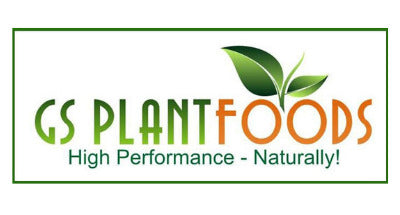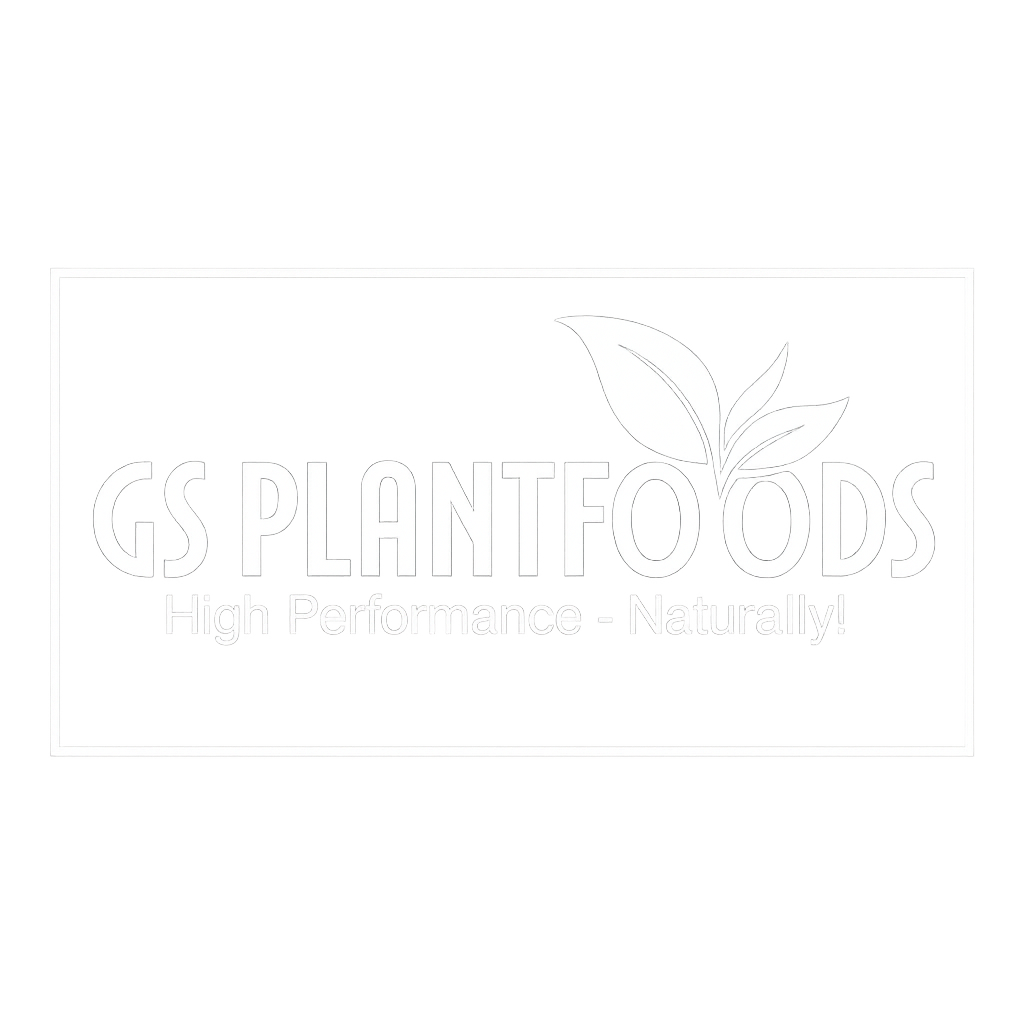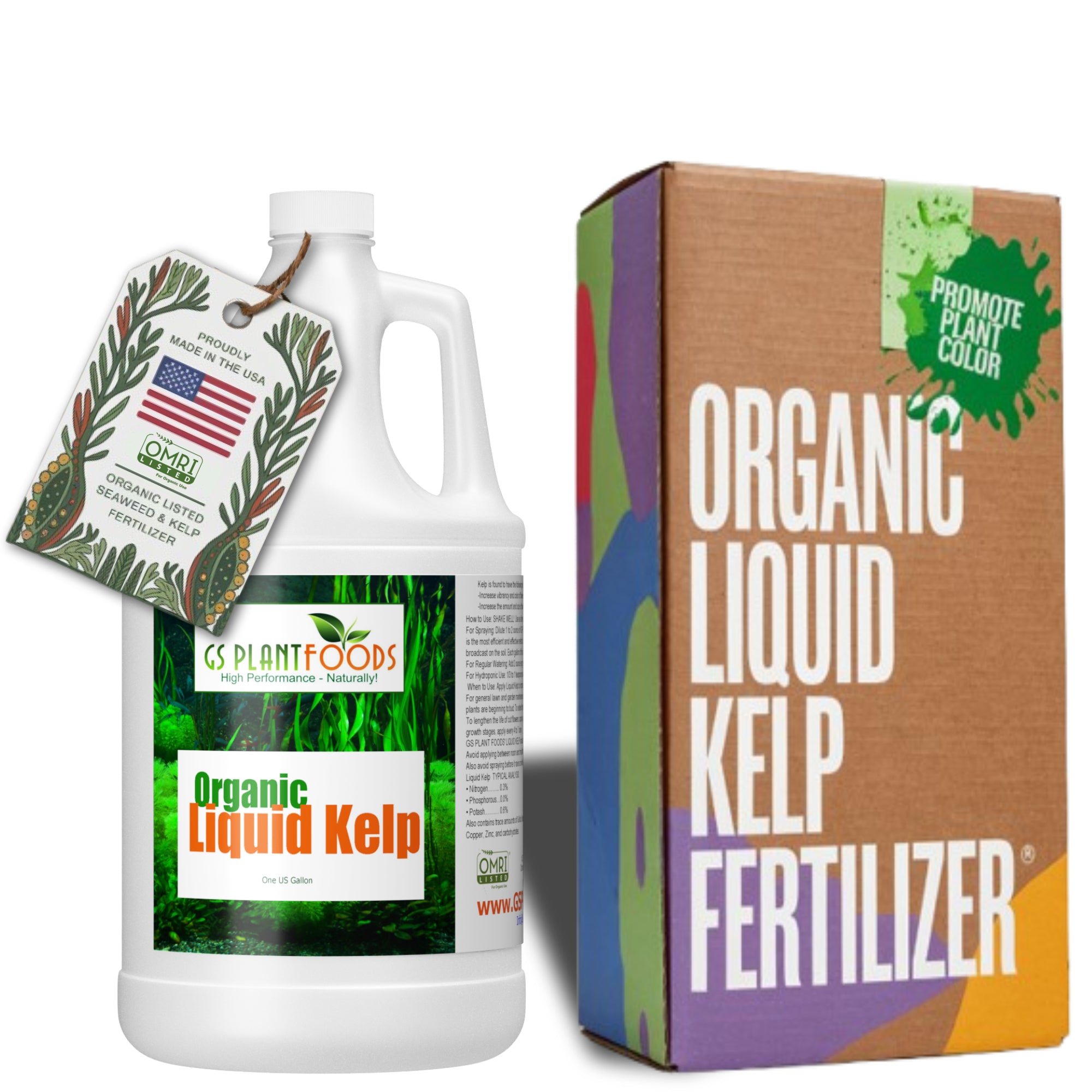
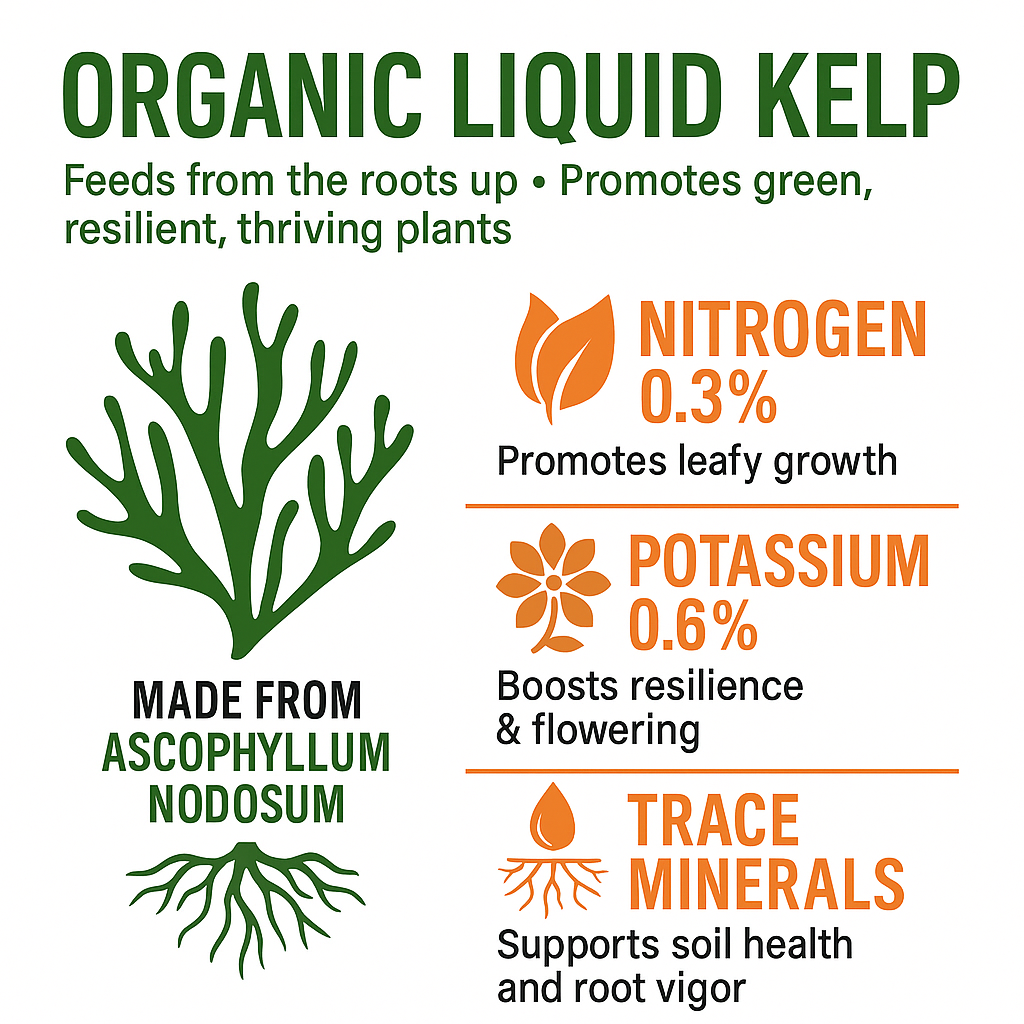
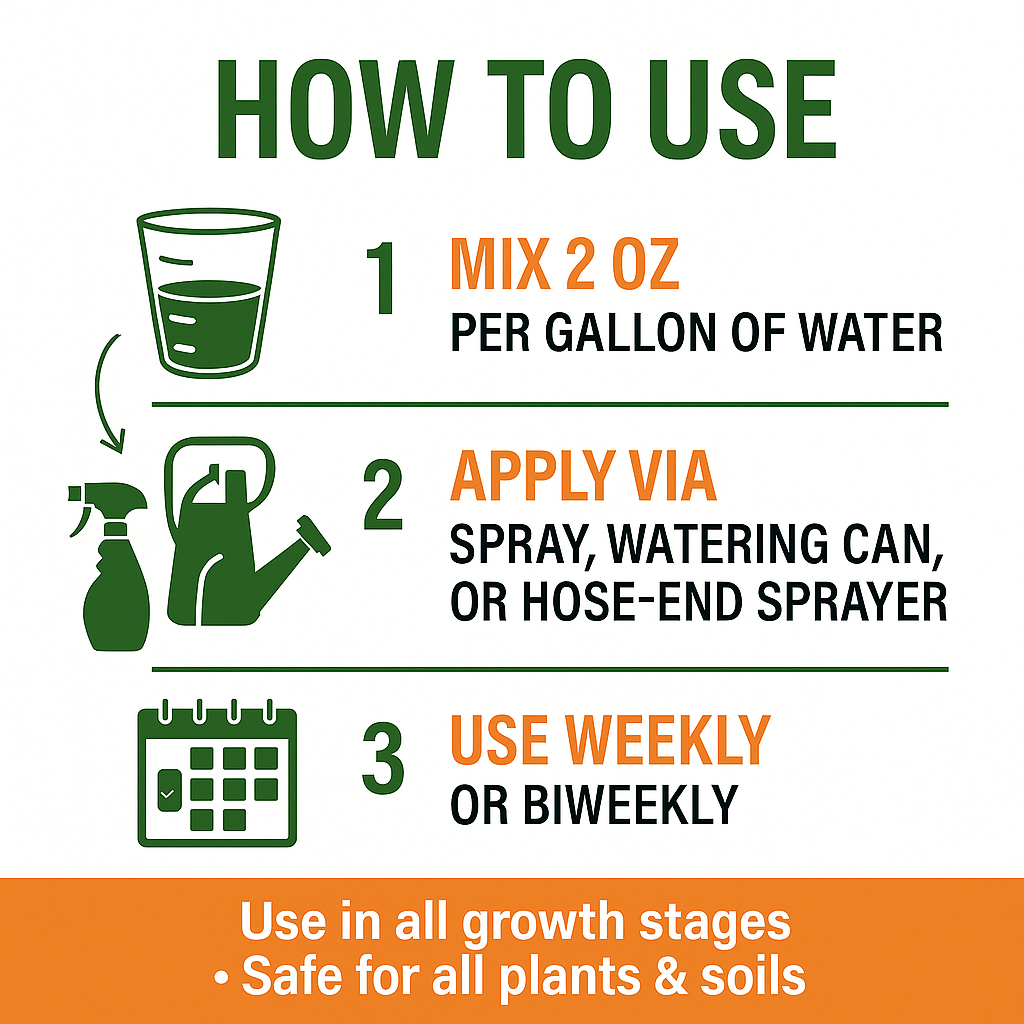
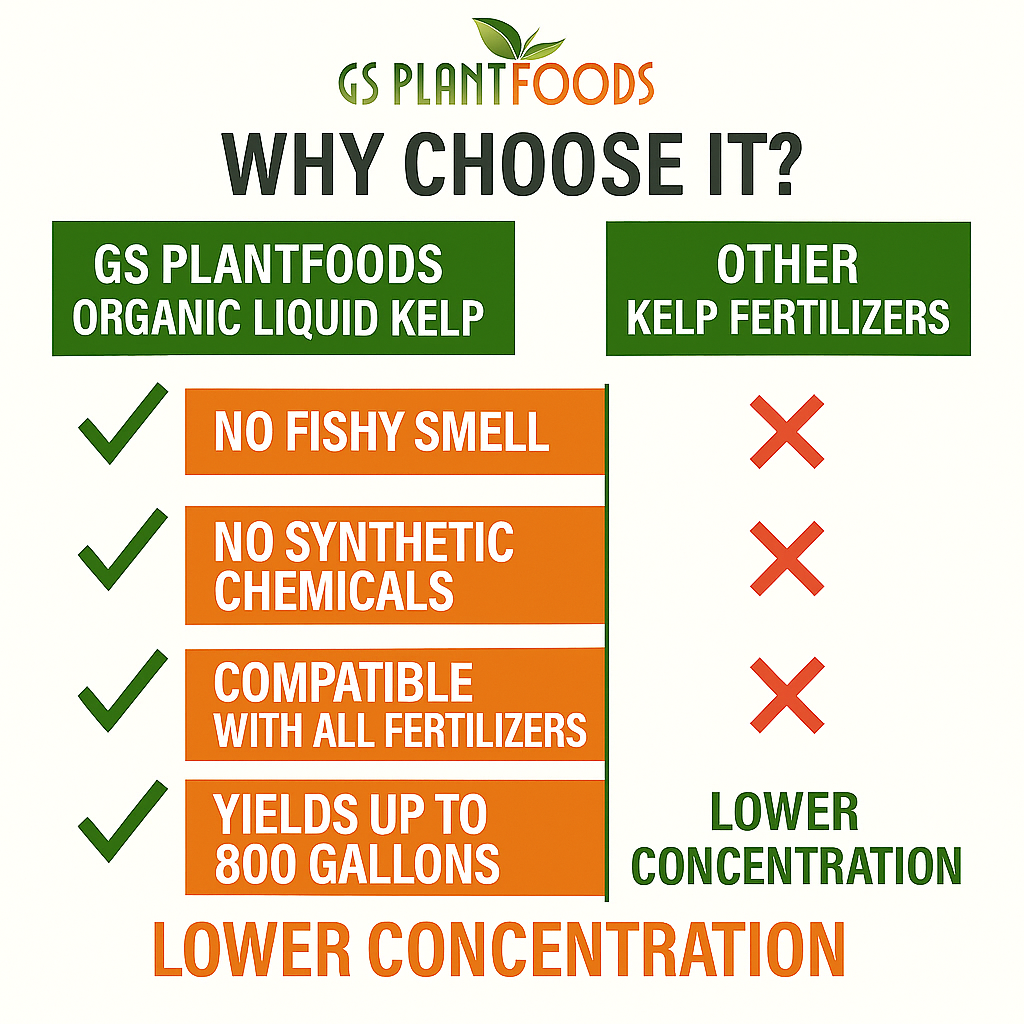
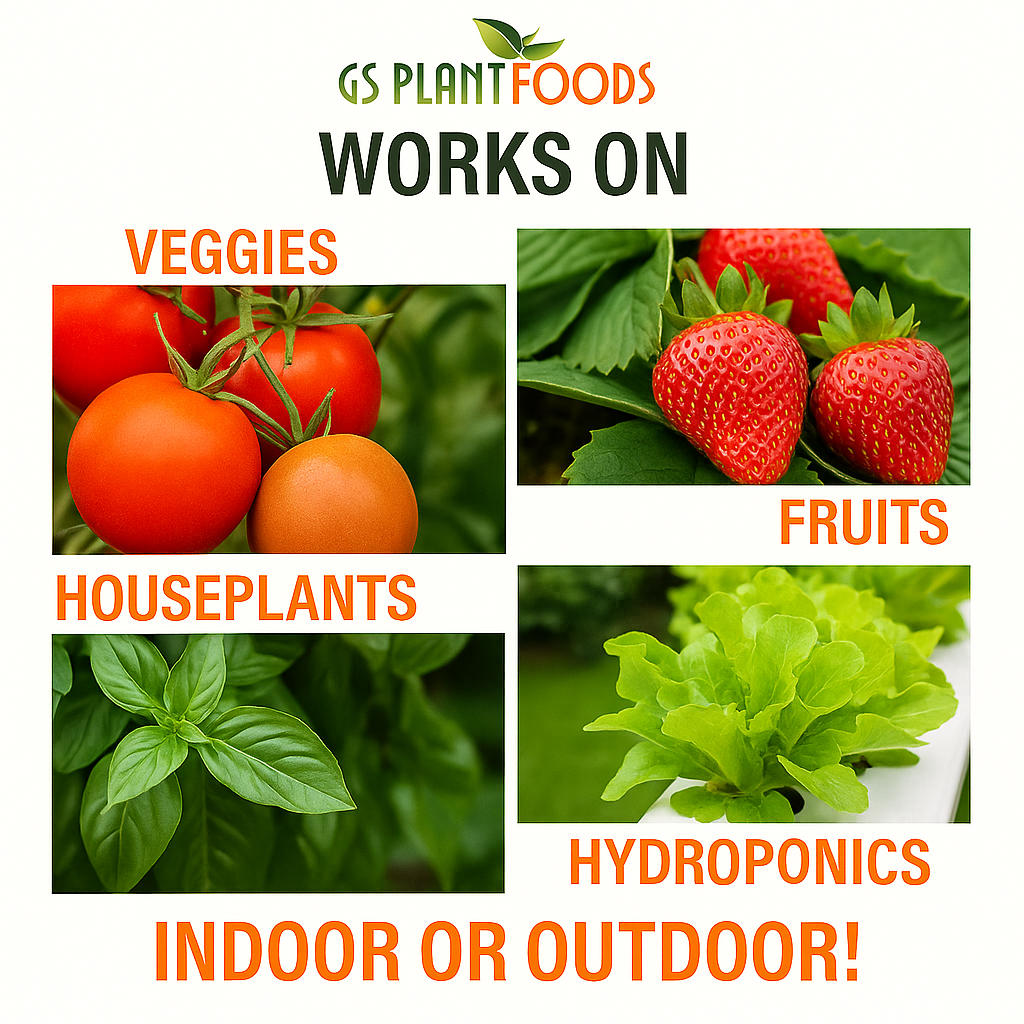
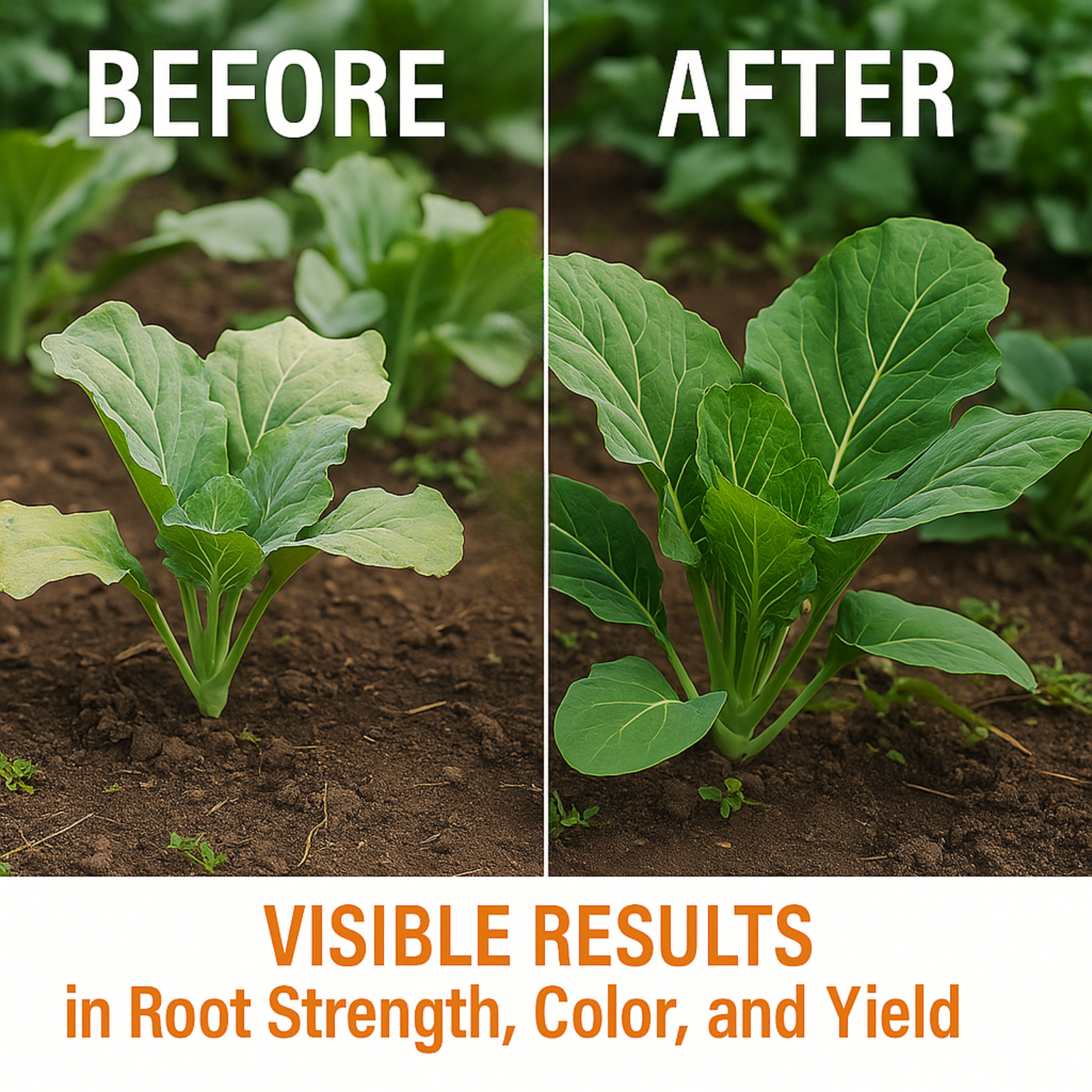
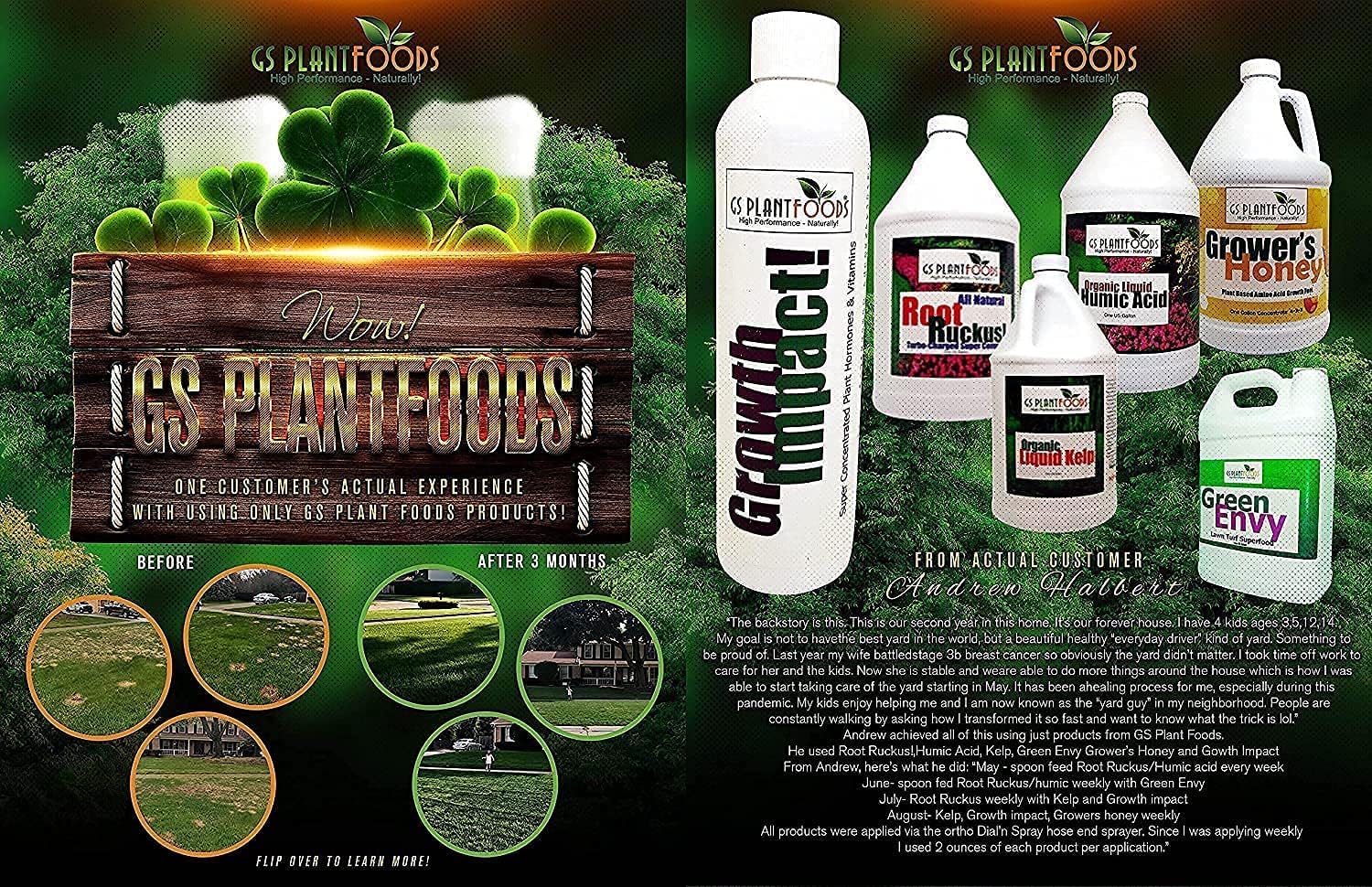
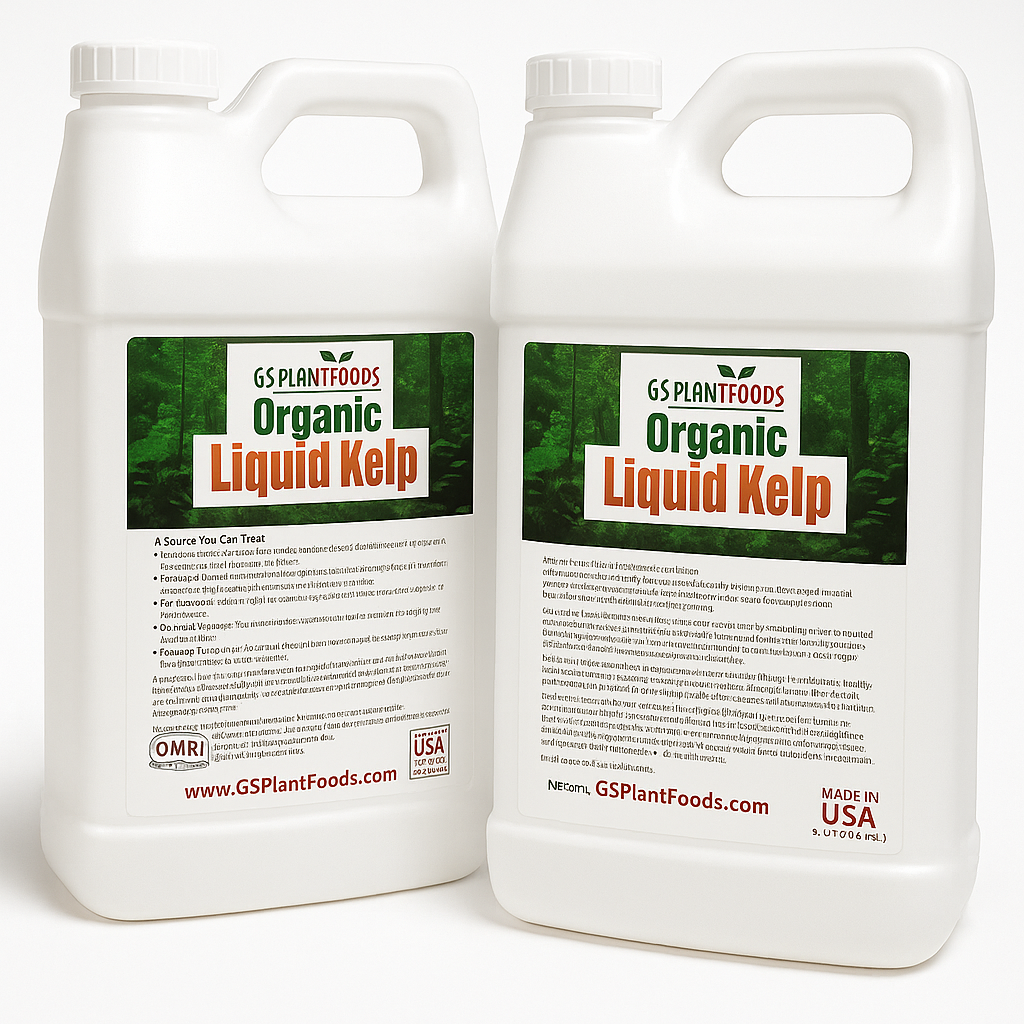
Organic Liquid Kelp Seaweed
Why Customers Love It:
✔ Fast-Acting Formula
✔ Direct from Our Facility – Always Fresh
✔ Ships Fast in 1–2 Days
Pairs well with

Organic Liquid Kelp Seaweed
If you have any questions, you are always welcome to contact us. We'll get back to you as soon as possible, within 24 hours on weekdays.
-
Shipping Information
At GS Plant Foods, we do our best to get your order to you quickly and affordably.
We primarily ship through USPS Priority Mail, which is fast and reliable. For larger or heavier orders, we may use FedEx Ground to save you on costs while still delivering on time.
If you prefer a different shipping method, no problem — just reach out before placing your order, and we’ll do our best to accommodate your request.
Processing Time:
Most orders ship within 1–2 business days. You’ll receive a confirmation email with tracking info as soon as your order is on its way.Shipping Costs:
Shipping fees are calculated at checkout based on weight, size, and destination.Sales Tax:
We currently collect 7% sales tax on all orders shipped to addresses in Florida. If tax laws change and we’re required to collect tax in other states, we will comply accordingly. -
Return Information
We want you to be completely happy with your purchase — and your plants to be even happier.
If your product arrives damaged or defective, just send us a photo and we’ll replace it right away — free of charge. No need to return anything.
We stand behind the quality of everything we sell. If something’s not right, we’ll make it right — it’s that simple.
If you have questions about a product or need help choosing the right one, don’t hesitate to contact us before ordering. We're happy to help!
-
Contact Us
Have an issue with your order or want to find out more information about a product?
If you have any questions at all, please leave us a message using the form below. A member of our team will be in touch soon!
-
Information
Share contact information, store details, and brand content with your customers.
What is Organic Liquid Kelp Seaweed?
GS Plant Foods Liquid Kelp is an organic seaweed fertilizer made from cold-processed Ascophyllum nodosum, harvested from the clean North Atlantic waters of Norway. This OMRI-listed kelp extract is packed with over 60 trace minerals, natural growth hormones, and essential micronutrients that boost root development, enhance nutrient uptake, and increase plant resilience to stress.
Perfect for gardens, lawns, houseplants, and crops, this eco-safe fertilizer works like a multivitamin for your plants—helping them grow stronger, greener, and more productive. A single gallon makes up to 800 gallons of nutrient-rich solution, making it a sustainable and cost-effective choice for organic gardeners.
If you want to try another formula, GS Plant Foods Fish & Kelp Liquid Blend combines hydrolyzed fish fertilizer for NPK 2-3-1 nutrients and beneficial microbes with Norwegian Ascophyllum Nodosum seaweed to enhance roots, stress resistance, and plant growth.
Key Benefits:
-
Root Growth Booster: Encourages deeper, stronger root systems.
-
Stress Protection: Helps plants recover from drought, heat, and frost.
-
Improved Photosynthesis: Promotes darker leaves and better chlorophyll production.
-
Bigger Yields: Extends flowering and fruiting cycles for improved harvests.
-
Eco-Friendly: Safe for pollinators, pets, and waterways.
Ingredient Breakdown:
-
Norwegian Seaweed Extract (Ascophyllum Nodosum): Organic Liquid Kelp Seaweed is packed with cytokinins, auxins, and over 60 trace minerals like sulfur, magnesium, zinc, and iron to nourish your plants and support healthy growth.
How to Use:
-
Foliar Spray: Mix 1.5–2 oz per gallon of water and apply weekly.
-
Soil Drench: Add 2–4 oz per gallon when watering at the plant base.
-
Hydroponics: Use 1 tsp per gallon in nutrient solution.
-
Pro Tips: Organic Liquid Kelp Seaweed fertilizer should be applied once a week, ideally in the morning or late afternoon when plant stomata are open. Avoid using it during the midday sun or before rain to ensure the best results.
Frequently Asked Questions:
Q: What is Liquid Kelp made from?
A: It’s made from 100% cold-processed Ascophyllum nodosum, a nutrient-dense brown seaweed harvested from the clean, cold waters of the North Atlantic Ocean.Q: Why use kelp on plants?
A: Kelp is nature’s secret weapon. It’s full of micronutrients and natural growth hormones that support faster germination, better root growth, and stronger resistance to drought and disease.Q: Is this safe for edible plants and organic gardens?
A: Absolutely. GS Plant Foods Liquid Kelp is OMRI-listed and safe for all plants, including fruits, vegetables, and herbs. It’s a great choice for organic gardening.Q: How often should I use it?
A: Apply every 1–2 weeks during the growing season for best results. You can spray it directly on leaves or pour it into the soil.Q: Can I mix it with other fertilizers?
A: Yes! Liquid Kelp pairs well with other fertilizers and even makes them work better by enhancing nutrient uptake.Q: Why is seaweed good for plants?
A: Kelp isn’t just food from the sea—it’s a powerhouse for plant growth. It naturally contains compounds that stimulate root and shoot growth, help plants manage stress, and improve nutrient absorption. It’s like giving your garden an ocean-grown advantage.
Liquid kelp, also known as seaweed extract, is a natural fertilizer made from seaweed. It contains a variety of beneficial nutrients, growth hormones, and trace elements that can promote plant growth and health. Many different types of plants can benefit from the application of liquid kelp, including:
Vegetables: Various vegetables such as tomatoes, peppers, cucumbers, zucchini, broccoli, and leafy greens can benefit from liquid kelp's nutrients, which can lead to improved yields and overall plant health.
Fruits: Fruit-bearing plants like strawberries, blueberries, grapes, citrus trees, and apple trees can benefit from liquid kelp, which may enhance flower and fruit production.
Herbs: Culinary and medicinal herbs like basil, mint, cilantro, and oregano can thrive with the help of liquid kelp, as it supports their nutrient uptake and essential oil production.
Ornamental Plants: Flowers and ornamental plants, including roses, orchids, lilies, and many others, can experience improved root development and enhanced flowering when treated with liquid kelp.
Lawns: Applying liquid kelp to lawns can improve soil health, stimulate root growth, and increase the lawn's ability to withstand stressors like drought and disease.
Shrubs and Trees: Landscape shrubs and trees, such as azaleas, rhododendrons, and various ornamental trees, can benefit from the use of liquid kelp to support their growth and overall vitality.
Indoor Plants: Houseplants, such as spider plants, pothos, peace lilies, and many others, can also benefit from the application of liquid kelp, providing them with essential nutrients for healthy growth.
Liquid kelp can be applied as a foliar spray or as a soil drench, and it is generally considered safe and beneficial for most plants. However, as with any fertilizer or plant supplement, it's important to follow the recommended application rates and guidelines to avoid over-fertilization, which could be detrimental to plants. Always read the product label and follow the manufacturer's instructions for the best results.
What Our Customers Are Saying
Thank you so much for Orchid Love. I bought mine on Amazon.com. I have been using it for the last five months. My orchids haven't looked better. Then I discovered a secret using your Orchid food. I have been dripping it down the old spikes of my 14 orchids not in flower for the last month. Now I have 5 of my orchids sending up new spikes that should be blooming around Christmas and 3 shooting secondary spikes off the old spikes. Even my other house plants love it. Thank you so much.
— Mary Yarwood
I received this product in a very timely manner. After the first application this seems to be working on my fall garden in zone 7. The lettuce, cauliflower, and broccoli all responded to a foliar spray of 1 Tbsp mixed in a half gallon of water. I also applied it to my tomato plants that had slowed down due to the colder weather and was surprised to see all of the plants start setting new blooms and fruit. I was at the point of actually pulling the tomato plants out for the year but look to maybe get a few more tomato's off each plant now!
— Theman
Hi, just received your kelp and humic acid per Amazon.I scoped them at 40 and 100x shortly after opening and could not believe the diversity compared to a competitor's similar products.I provide the most thorough organic lawn/soil treatments in the Gainesville Fl area, and looking forward to continuing business."Thanks for your product
— Chad Freeman
So far, my plants and microgreens seem to respond well--new growth and deeper color--to the spray I mixed with water and store in the refrigerator.
— Greenpinky
My only complaint is that the bottle could be designed better so that the liquid doesn't drip everywhere and get a little messy even when using a funnel to catch extra liquid.
It smells strong & stains, so prepare your mixture outside or on a plastic covered table.

Why Choose GS Plant Foods?
✅ Certified Organic Excellence
Every product reflects our pledge to purity, free from synthetic additives. We prioritize ingredients that nourish plants and protect ecosystems.
🔬 Innovation You Can Trust
Blending cutting-edge plant science with time-tested organic methods, we create solutions that tackle modern challenges—boosting yields, resilience, and root vitality.
🤝 Community Trusted
Decades of glowing reviews and partnerships prove our promise: reliable, transformative results, season after season.
FAQs
Please read our FAQs page to find out more.
Why do organic fertilizers like yours have lower NPK values than synthetic fertilizers?
Synthetic fertilizers artificially spike NPK levels far beyond natural amounts, much like vitamin pills overload the body with nutrients it can’t fully absorb. Organic fertilizers, however, workwithnature—enhancing plants’ ability to uptake nutrients efficiently without excess runoff. This means lower NPK numbers deliverhigher effectivenesswhile protecting ecosystems from pollution caused by synthetic waste.
How should I store your products to maximize shelf life?
Store products in a cool, dry place away from direct sunlight and extreme temperatures. Ensure lids are tightly sealed after use. While most formulas have an indefinite shelf life, always mix only what you need for immediate use to maintain potency.
Do I need to water my lawn after applying your liquid fertilizers?
No watering is required! Our liquid formulas absorb quickly into the soil. For best results, apply early in the morning to allow 2-3 hours of soaking time before rain or irrigation. This ensures maximum nutrient retention without runoff.
Is it safe to harvest vegetables right after using your products?
Yes! Most of our products have a zero-harvest interval, meaning you can pick produce immediately. However, we recommend waiting 2-3 days after application for optimal nutrient absorption and flavor development.
How do organic fertilizers reduce environmental harm compared to synthetics?
Synthetic fertilizers overload plants with nutrients they can’t fully absorb, leading to harmful runoff that pollutes waterways. Organic formulas, like ours, mimic nature—delivering balanced, bioavailable nutrients that plants use efficiently. Think of it as feeding your garden a wholesome meal instead of forcing it to “overeat” synthetic additives.
